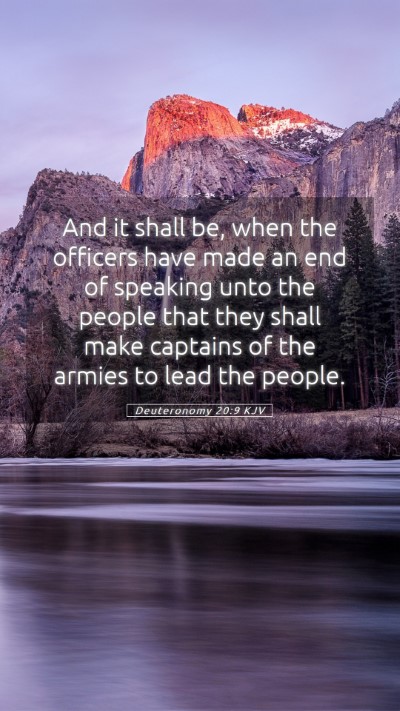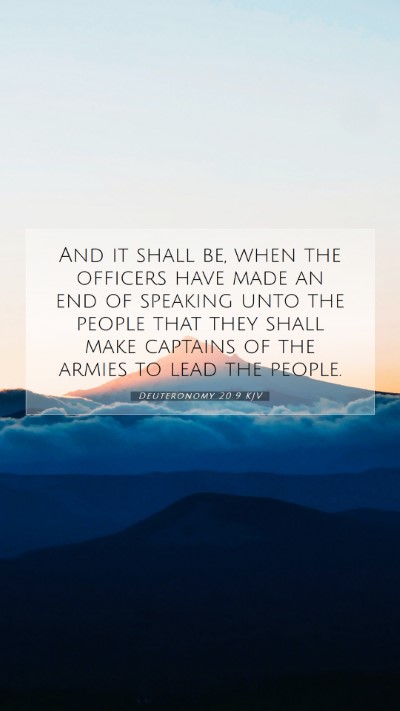Understanding Deuteronomy 20:9
In Deuteronomy 20:9, we encounter a significant directive concerning the conduct of Israel during wartime. This verse serves as a part of the larger discourse on the regulations for engagement in battle that were provided to the Israelites as they approached the Promised Land.
Bible Verse Meaning
The verse reads: "And it shall be, when the officers have made an end of speaking unto the people, that they shall make captains of the armies to lead the people." This formulation indicates the importance of order and leadership in the Israelite camp as they prepared for battle.
Insights from Public Domain Commentaries
-
Matthew Henry's Commentary
Matthew Henry emphasizes the necessity of having appointed leaders for the military endeavors. He explains that this not only reflects organization but also instills discipline within the ranks. It is vital for unity and focus, as each soldier is to know his role and follow his appointed leader.
-
Albert Barnes' Notes
Albert Barnes notes that the officers' primary objective is to prepare the people spiritually and practically for battle. This preparation includes the reassurance from the officers, which serves to bolster the morale of the soldiers, reminding them of God's assistance as they venture into conflict.
-
Adam Clarke's Commentary
Adam Clarke discusses the historical context that led to the establishment of captains over the armies. He mentions how such roles were crucial for guiding the people, particularly given the diverse backgrounds of the troops. This designation also includes a sense of accountability and responsibility for the leaders, prompting them to act wisely in leading their men.
Key Themes and Applications
-
Leadership in Crisis:
The importance of leadership during times of crisis cannot be overstated. Just as the Israelites were organized to face their enemies, modern believers can learn about the significance of strong leadership when faced with challenges.
-
Preparation and Readiness:
There is a lesson in spiritual and practical preparation. Understanding the roles of leaders enables individuals, whether in a military context or in everyday life, to function effectively and purposefully.
-
Unity Among Believers:
Just as the captains were appointed to lead, Christian communities today can reflect on the necessity of unity and collaboration under strong leaders, fostering an environment where everyone works together toward a common goal.
Related Bible Cross References
- Exodus 18:21 - Moses appointed leaders over the people.
- Numbers 1:4 - Leaders of the tribes were counted and organized.
- Joshua 1:10-11 - Joshua commanded the officers to prepare the people for crossing the Jordan.
- 1 Corinthians 14:40 - Paul reminds the Church of the importance of order in worship and practice.
- Hebrews 13:17 - Encouragement to obey and submit to leaders in the faith.
Using This Insight in Bible Study
This analysis reflects important concepts for anyone engaging with Bible verse meanings and Bible verse interpretations. It encourages Bible study insights for groups seeking to understand Scripture in both historical context and practical application today. The themes found within Deuteronomy 20:9 serve as excellent discussion points for Bible study groups or online Bible study. Utilize this as a guide in your Bible study lessons or as a reference in Bible study plans.
Conclusion
In conclusion, Deuteronomy 20:9 prompts readers to consider not only the historical implications of military leadership within the Israelite context but also the broader themes of leadership, preparation, and unity that remain relevant today. We encourage those looking for Bible verse explanations and understanding Scripture to engage deeply with this text and consider its applications in modern contexts.


